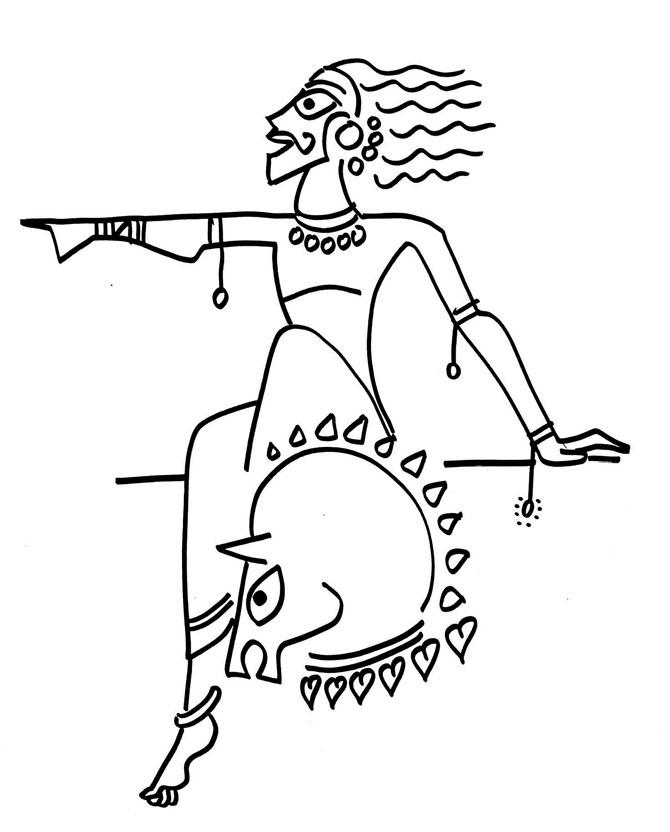Most of us assume that what we know and understand is ‘the’ truth. We do not check if others agree with us. What constitutes the truth?

Devdutt Pattanaik column, Devlok
 Most of us assume that what we know and understand is ‘the’ truth. We do not check if others agree with us. What constitutes the truth? Does memory constitute truth? Does proof constitute truth? Does measurement constitute ? Do what gurus/politicians/scientists tell us constitute truth? Does agreement by the majority constitute truth? Is what ‘feels right’ the truth? Is there such a thing as the truth? Is truth static or fluid, changing with space and time and point of view?
Most of us assume that what we know and understand is ‘the’ truth. We do not check if others agree with us. What constitutes the truth? Does memory constitute truth? Does proof constitute truth? Does measurement constitute ? Do what gurus/politicians/scientists tell us constitute truth? Does agreement by the majority constitute truth? Is what ‘feels right’ the truth? Is there such a thing as the truth? Is truth static or fluid, changing with space and time and point of view?
ADVERTISEMENT
Truth, sadly, seems rather complicated. So, naturally, despite media outrage, the courts of India have their own version of the truth that we have to accept, or face contempt charges. So, whether we like it or not, gays remains unworthy of constitutional human rights; rape victims and their families can watch rapists being protected by the system; Bollywood stars can get away with murder and manslaughter; politicians who became famous by sparking riots are given state honour; followers of gurus are convinced their gurus do not financially and sexually abuse them, despite evidence. We end up submitting to someone else’s version of the truth.

Illustration/ Devdutt Pattanaik
To understand truth, it is useful to familiarise ourselves with three terminologies commonly used by philosophers. These are ontology, epistemology and phenomenology.
‘Ontology’ is the study of things as they are. An understanding that does not depend on the mind. ‘Epistemology’ is study of knowledge and knowing. Unlike ontology, which seeks to be mind independent, epistemology is mind dependent: it appreciates how the mind processes ‘as things are’ and create categories and connections to make sense of the world. Then there is ‘phenomenology’, which seeks to understand how an individual experiences reality. Here, intention and prejudice play a key role.
Phenomenology is overtly subjective and individualistic. Ontology is overtly objective and non-individualistic, located outside human sensory, emotional and intellectual experiences. In between is located epistemology, which appreciates how the mind gives identity, meaning and value and so knows and creates knowledge.
Epistemology helps us understand how power is distributed and how meaning is attributed and value granted. Epistemology reveals how differently cultures view the world differently, how even scientists create structures to give meaning to the world. For example, Hinduism looks at the world through the lens of karma, Greek (and that includes post-Renaissance ‘modern’ and ‘post-modern’ thought) thought looks at the world through the realm of chaos and progress, Abrahamic thought looks at the world through the lens of creation, damnation and salvation, science looks at the world through measurement, experiment and evidence. Mythology — the study of stories, symbols and rituals — claims to be ontological, needs to be appreciated phenomenologically, and ultimately reveals epistemiological frameworks.
Ontology remains controversial. Everyone claims their version of the truth is ontological — as it is, and mind-independent. But the problem is that the moment an ontological truth needs to be communicated, it needs to pass through epistemological frameworks that shape language and communication and so what is heard is not quite ‘as things are’ (ontology) but ‘as things make sense’ (epistemic) or even ‘as things are experienced’ (phenomenon).
Our courts seek ontological truth — but often submit to prejudice, and ignore knowledge. So, we are stuck with a pompous and hollow phrase ‘truth shall prevail’ (Satyamevajayate), clueless about which truth, or whose truth, dominates our lives.
The author writes and lectures on the relevance of mythology in modern times. Reach him at devdutt@devdutt.com
The views expressed in these columns are the individual’s and don’t represent those of the paper.
 Subscribe today by clicking the link and stay updated with the latest news!" Click here!
Subscribe today by clicking the link and stay updated with the latest news!" Click here!






